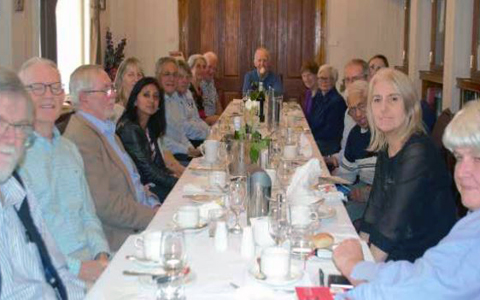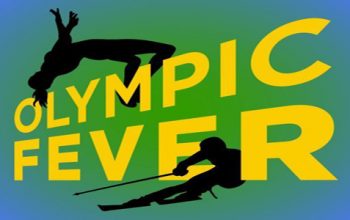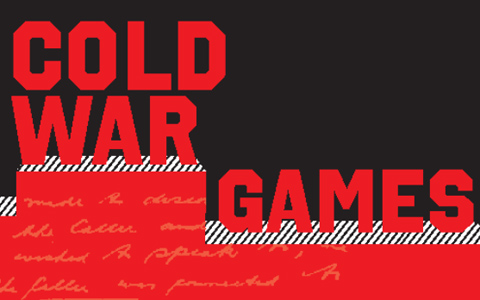On 12 April 2019, Harry Blutstein led a lively discussion on how communist regimes used sport to promote communism. It was held at Graduate House.
After the 1917 revolution, the USSR tried to create a new world based on equality. This included sport, and Stalin was keen to avoid “bourgeois sport” which ‘deflected workers from the class struggle and to train them for new imperialist wars.’ He also disliked the Olympic movement which is always run by aristocrats, retired military men and businessmen from the capitalist West; and in this he was right.
Sport in the USSR was different. Built around a 1931 program called GTO – Ready for Labour and Defence – it introduced an intensive program of sport from the very young upwards. While it was not meant to be competitive, it soon became so, particularly in areas like football. Sports had a particularly military flavour and included events such as grenade throwing, parachuting, target shooting and cross-country motorcycle races.
To provide a forum for sport annual Spartakiads were held as an alternative to the Olympic Games.
The Games started with the parade of the autonomous republics, 15 in total. This was not much different than ancient Rome, in which the captive nations would be paraded around the Coliseum as a tribute to the supremacy of Rome. The only difference is they did not wear chains. Instead women from Belarus marched in colourful folk costumes. Men from the caucuses and falcons perched on the outstretched arms and turban horsemen from the Tadzhik Soviet Socialist Republic completed the parade. Then thousands of young boys and girls, some as young as 10, performed mass gymnastic demonstrations such as tossing patterns, ribbons and large balls into the air. Weightlifters marched in rows, juggling heavyweights while acrobats did tricks off the back of moving motorcycles. In a country that could not afford enough bread for its people, he could at least provide such magnificent circuses.
Sport was built around clubs that covered all disciplines, and were associated with major institutions, such as the army (Dynamo), secret police, Navy and union movement (Spartak). This fitted in nicely with the idea that state institutions were supreme, but also had some unintended consequences.
- It provided an avenue for the average person to protest. Example Dynamo football matches.
- Power brokers within the Kremlin, who sponsored teams, use the successes of the team, particularly in football, to burnish their own prestige within the Communist Party hierarchy.
Stalin was no great fan of sport, although he did occasionally play handball. However, after the Second World War there was strong pressure on him to use sport as a weapon in the Cold War. He was reluctant, an ideological grounds.
To be used for propaganda then Soviet teams would have to always beat the Western opponents. This was a problem because the Soviet Union had not participated in international competition, and it was unclear whether they would be internationally competitive.
Two things changed after the war. The USSR created an empire in Eastern Europe. These countries were firmly wedded to the Olympic Games, and not at all interested in Spartakiads. Second, with the Cold War on, new ways had to be found to win the hearts and minds of unaligned countries, and one way to do this was to show that on the sporting field the new Homo Sovieticus was superior to athletes bought up in the capitalist system.
After the war ended, the USSR and Great Britain still considered themselves allies, and there was a lot of goodwill towards one another. This goodwill paved the way for a series of friendlies throughout the UK.
At this point of time, Dynamo was supreme, and therefore it was given the honour of representing the USSR. Its rise was, in no small measure, because its patron was the feared head of the secret police Lavrentiy Beria. At the time he was supreme in the domestic league, but this was not the case before the war, and when Spartak beat Dynamo in the domestic competition in 1938, it put a huge dent into Beria’s prestige within the Kremlin power structure. After that game, having lost, Beria insisted the game played again. And once again, Spartak won, which took great courage as many of the enemies of Beria ended up in Siberia. Legendary manager of Spartak was Nikolai Starostin, who knew the risks of making such a powerful enemy. However Spartak was very popular with ordinary people and Beria bidded his time. In 1942, Starostin was arrested and sent to the Gulag.
The Gulag was not such a bad place for the former football manager. ‘With the passage of time, I am no longer surprised that the camp bosses, responsible for the fates of thousands and thousands of people, perpetrators of inhumanity is an horrors of the Gulag, related so positively to anything having to do with football.’ And so he was traded from camp to camp, each offering him better conditions and privileges.
In 1948, he was in a camp in the Far East when he was woken up in the middle of the night. ‘Get dressed,’ he was ordered. ’You urgently need to call Stalin!’ It was Vasily Stalin, who flew in back to Moscow. He was quickly arrested by Beria, in return to the Gulag. Vasily Stalin had the train stopped, and again he returned a very reluctant Starostin to Moscow, we put under his personal protection, so he could train the Air Force team, VVF. This was a power played by the younger Stalin to improve his position within the Kremlin. And Beria knew it. Eventually, Starostin escaped back to the Gulag.
As a result of his arrest, the fortunes of Spartak declined and those of Dynamo improved, which is why it was selected to tour the UK for the series of friendlies. At those matches was a talented writer and journalist, George Orwell, who wrote at the end of his report: ‘Serious sport … is war minus the shooting.’
In 1952, USSR competed in its first Olympic Games in Helsinki. Though originally going to compete in the 1948 Olympic Games, but fail to attend when Stalin had insisted that his Minister of Sport, Nikolai Romanov sign a piece of paper guaranteeing that the USSR would beat the US in the middle count. Stalin was not a man to be disappointed, and Romanov gracefully declined to sign the piece of paper. But he did so in 1952, having exposed his athletes to international competition in the intervening years.
In Helsinki, Soviet officials were not totally comfortable mixing their athletes with those from the West, and so they established their own Olympic Village. In an effort to show that they came from a peace-loving country, they invited US rowers over for a meal of vodka and caviar. When one of the Americans, Dick Murphy, accepted a hammer and sickle badge the Russian warned him: ‘Should you wear this in the United States they would put you on the electric stool.’
Romanov had to report daily to Stalin and the rest of the politburo on how many gold medals USSR won. Of all the events, Stalin was particularly keen to see his football team beat Yugoslavia. He and Tito hated one another, to the extent that they’d sent assassins to kill the enemy.
The football team that went to Helsinki was called the Team of Lieutenants. By now the power struggle in the Kremlin had turned, and following the war the generals have the upper hand, while Beria was no longer trusted by Stalin, because he believed that he was working to replace him after his death. The match was politically charged, as Stalin and Tito hated one another, and a loss would be humiliating to either dictator.
By half-time it was down, 0-3, and it’s best player, Bobrov, was receiving injections of Novocain for his knee. In the second half, Yugoslavia scored another goal and the score was, 0-4. And then, the injured Bobrov came to life and scored two quick goals, which inspired his team and with 29 seconds to go, and still 4-5 down, the Soviet player took a corner and was headed into the net. Even after 30 minutes of extra time they couldn’t break the tie and another game was held two days later.
After the game, the players were read a two-page letter by Stalin telling them that they ‘had to win.’ Every player new to add the words ‘or else.’
In the rematch at halftime the Yugoslavs were 2-1 up, and they scored another goal in the second half, winning comfortably, 3-1.
The manager of the Soviet team was a call to Moscow to explain to the politburo why he had lost. When he was asked whether the team was mainly taken from the army, he said it was. In fact this was untrue and half the team were taken from the secret police. However, Beria was in the room and he saw no reason to antagonise him.
The members of the Olympic team returned to the domestic competition, and the Army team won its first three games before one wet Saturday they were met by the Minister for Sport, Nikolai Romanov, who told them that they had just been disbanded.
The next test was the 1956 Olympics in Melbourne. By now, Joseph Stalin was dead as was Beria, while Vasily Stalin was in jail. Starostin had returned from the Gulag and was once again the manager of Spartak. Under his leadership, it dominated the local competition, and the team that represented the USSR in Melbourne was mainly composed of players from Spartak.
Having struggled with its earlier games, much to everyone’s surprise, USSR came up against Indonesia in the quarter-final. No one gave Indonesia a chance; in recent friendlies in Yugoslavia it had lost every game by large margins. Believing that it had no chance of winning, Indonesia’s Yugoslavian coach came up with a novel tactic: 1-9-1. Playing total defence, the Soviets could not penetrate and after the first half the score was 0-0. In the second half, as the Soviets continued to pepper the goal — despite having 27 corners and 68 shots on goal — without success. One of the shots on goal bounced off the top bar over the head of the Soviet goalie and the heads of the nine Indonesian defending players. It also went over the heads the nine attacking Soviet players. It landed at the feet of the single attacking Indonesian, who started to head for his goal. What was worse for the Soviets was that its goalkeeper had come up to the centre circle to watch the game, and suddenly there was a foot race to see who would get back to the golf face first. The goalkeeper got back just in time to deflect the ball with his fingertips over the bar. Had the Soviets lost it would have been humiliating from a sporting point of view, but also a major propaganda defeat.
In the replay the Soviets won easily, 4-0, having now worked out how to deal with the Indonesian tactics.
USSR reached the final and its opponent was Bulgaria. In the first half neither is team scored, but to Soviet footballers were injured, with one having broken his collarbone. In 1956, substitutes were not allowed. Coming into the second half, the Bulgarian scored a goal. The Soviet team hope to use its injured player as a decoy, but as he had his arm in a sling the Bulgarians knew he was seriously injured and ignored him, hoping to use their superior numbers in front of goal to win. As it turned out, the unguarded injured player found the ball at his feet on two occasions, and scored, helping USSR to a gold medal. A 1958 edition of the Soviet newspaper Pravda explicitly acknowledges the propaganda value of sport: “An important factor in our foreign policy is the international relations of our sportsmen. A successful trip by the sportsmen of the USSR or the people’s democratic countries is an excellent vehicle of propaganda in capitalist countries. The success of our sportsmen abroad helps in the work of our foreign diplomatic missions and of our trade delegations.



